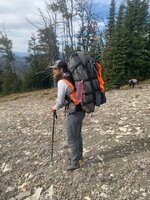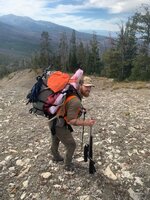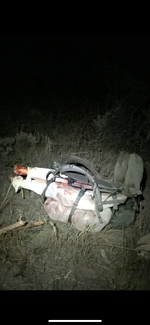What type of country are you hunting in? If you are hunting at high elevation, that can definitely play to your advantage in allowing you to get way tf out there to harvest an animal as long as you are physically capable of making the trips to pack it out. It just takes a lot of thinking ahead and occasional reality checks to make sure the animal you take down can hang in the woods long enough to get out safely.
Maybe my story from last year can give you a few things to think about (or just scroll down for the TLDR portion)-
I also like to get a long way from other hunters. Last year, that led me to arrow an elk 5 miles from the nearest trailhead and 4 miles off-trail at the top of an alpine basin. But, I took a few things into account before I drew my bow:
1) I knew, given the terrain and elevation (11,400ft), that temperature wouldn't be an issue, and that I could find a shaded north-facing spot to hang meat for as long as I needed.
2) As I hunted my way up the basin, I took note that there were zero bear scats above ~9,000ft of elevation. That doesn't guarantee that a bear won't smell it on the wind and go up there, but I knew the chance would be low. I still hung the meat as high as I could get it, away from the gut pile. I did have some sort of small critter gnaw through the corner of one bag (more on that in a sec), but other than needing to replace the bag, the damage was minimal. (Argali bags, BTW. They're great- super light, keeps bugs out, lets the meat form an excellent pellicle)
3) I also paid attention to time of day- can I shoot an elk, gut and quarter it solo, and get it hung before it's dark? (I had a light & spare battery, but I prefer to use a knife in daylight). Yes... it was a little after noon when I called him in. All systems go.
Even with that foresight, I still ended up not being able to pack the first quarter out the first night- A thunderstorm (thundersnow, yay!) rolled in just after sunset, and, because of how slippery everything was, I had to make the tough decision to hang one bag a mile lower than the others (that's the one that got chewed on). It was basically, "I can risk this one bag of meat, because right now, it's pitch black, the terrain is gnarly AF, and everything is so slippery from the storm that there's a real risk of me breaking a leg and getting a SAR call because it's easier to suffer a catastrophic slip/fall with a pack that weighs nearly 40% of my body weight."
I deboned each quarter as I packed them out (it hung on-bone). I had a backstrap/tenderloin/heart/random cuttings bag (~35 pounds), 4 quarters (shoulders ~45 pounds each, hindquarters ~55 pounds each), and the head. Luckily, I had a friend help me with the hindquarter trip, and my husband was finally off work for the last trip, meaning I got an easy day of just carrying the antlers out while he packed the last shoulder (otherwise I would have packed the antlers and shoulder together). So, it took a total of 4 trips to get him down.
T.L.D.R. advice from someone that's done a really stupid packout-
Your 1.5 mile limit is very reasonable, as you could likely make the trips back to back. It sounds like you're pretty fit as well, so given that and the relative shortness of your trips, you can probably carry more than one bag at a time to cut down on the number of trips you make. (I'm really fit, and pretty strong for my size, but shit, my size is still not very big.) Your "big cooler in the truck" strategy should work great for that. But, if you have some good high country terrain available to offer cold temps, and you're willing to push your physical (and mental FFS) limits, don't be afraid to push that distance out a little as needed... just be smart about it.




